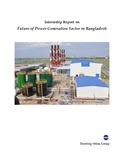Future of power generation sector in Bangladesh
Abstract
Bangladesh is one of the fastest growing economies in South Asia with a progressive economy has grown at an annual rate of around 6%. The Government of Bangladesh now promise to achieve the status of a ‘middle-income country’ by 2021 and that of a ‘high-income country’ by 2041. Working as an Executive Engineer at Orion Group, I am always very much interested on the power sector of our country. As electricity plays a vital role in poverty eradication, sustained economic growth, infrastructure development and security of any country, Bangladesh will need to address the barriers to higher growth posed by low access to reliable and affordable power, rapid urbanisation, limited availability of serviced and vulnerability to climate change and natural disasters and many more to achieve its socioeconomic growth targets. The performance of Bangladesh’s power sector in the last five years has been impressive due to the progressive efforts of policymakers, support from developing partners, and effective project implementation by public and private developers. Moreover, massive capacity enhancement and expansion projects of the power sector are being undertaken. In accordance with the recent Power System Master Plan, Bangladesh aims to add 2 GW renewable energy (RE) projects to achieve installed capacity of 2,470 MW by 2021, and 3,864 MW by 2041. Solar and wind will be the key focus areas for future capacity addition, which shall account for about 50% and 40% of the 2,896 MW of RE-based installed capacity by 2021, respectively. This report provides views on the megatrends in the global power sector and how those will impact Bangladesh in its power sector transformation journey. Besides, the report provides suggested actions for Bangladesh on thematic areas such as government and regulations, financing and investments, RE, and technology in which disruptions are impacting the country’s power sector.

